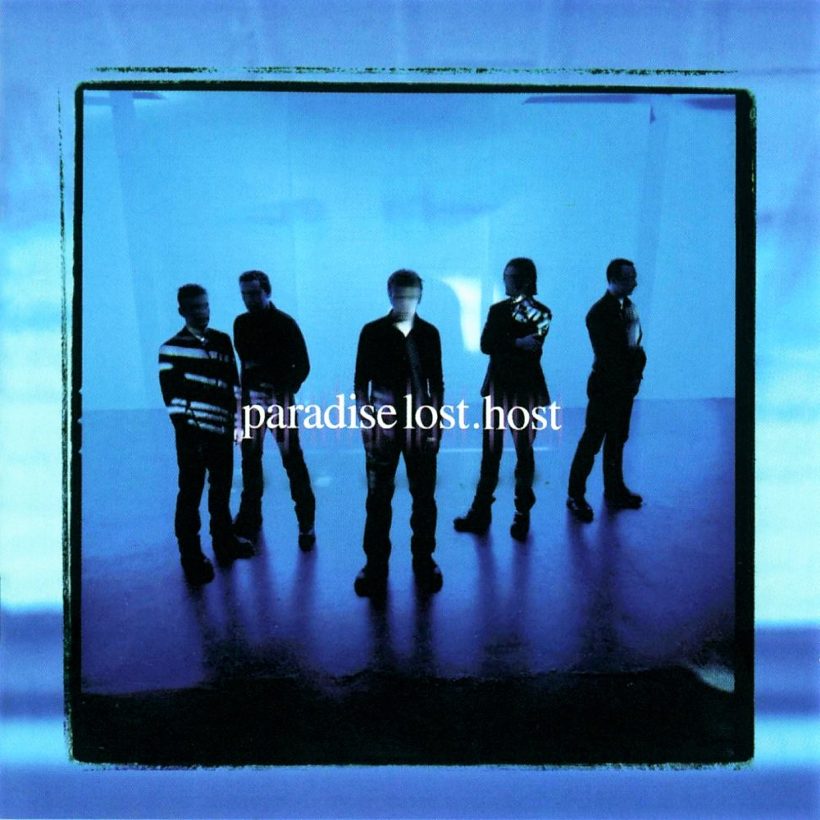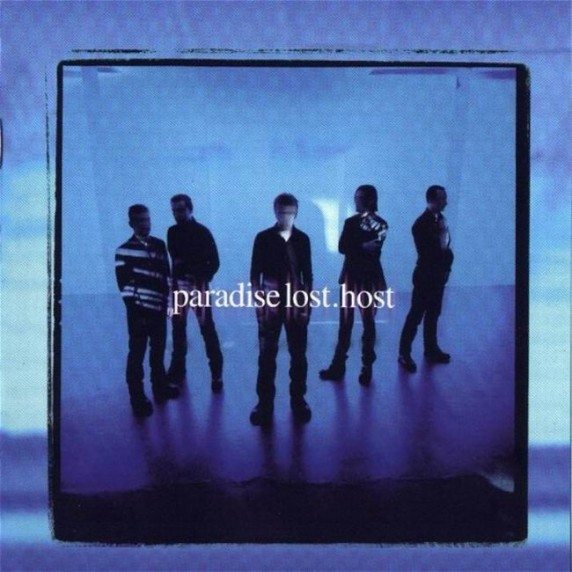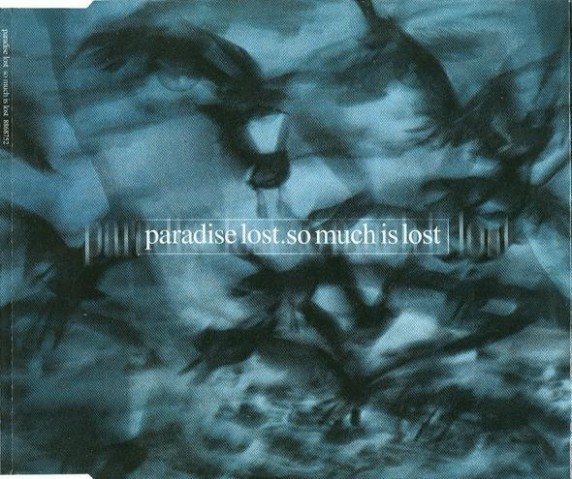
Almost every band has that album: you know, the critically and/or commercially reviled dud in an otherwise passable-to-radical back catalog. Well, every Wednesday morning, a Decibel staffer or special guest will take to the Deciblog to bitch and moan at length as to why everybody’s full of shit and said dud is, in fact, The Shit. Today, Greg Moffitt goes long and strong for Paradise Lost’s Host.
“We are seen as the leaders of our field. It’s up to us to do something different with this and not become a parody of ourselves and sound like all the bands that copy us anyway. We don’t want to fit into any scene whatsoever.” —Nick Holmes, 1997
“A lot of people said, ‘You can’t do this,’ but somebody’s gotta try and do something different, ’cause everyone does the same fucking shit.” —Nick Holmes, 2001
Get past the trendy haircuts and the lousy write-ups, and Paradise Lost’s much-derided seventh album may surprise you. In a classic case of received rock wisdom, many of Host’s most vociferous detractors haven’t even heard it. Yes it’s slick, yes it’s synth-driven and no, it’s not metal, but Host—released in 1999—is every bit as dark and despondent as anything the band has recorded. What the naysayers really resent, however, is the fact that PL had the sheer audacity to move the stylistic goalposts without asking permission. Their previous album, 1997’s One Second, may have ramped up the use of keyboards and smoothed over some of the edges, but Host went further than anyone might have expected. Even for a band who had a long history of chopping and changing, this was quite a leap. What tends to get lost amid all the talk about synthpop this and Depeche Mode that is whether the songs are actually any good; but when you get down to it, Host is pure Paradise Lost through and through.
The fact that I recall almost nothing about the events surrounding the release of Host says a lot. It clearly didn’t cause that many waves. I do recall a ripple of consternation from longtime fans concerning the relatively commercial One Second, but that was quickly wiped out by the sound of the all the band’s newfound fans stampeding to buy it. Quite simply, Paradise Lost were on such a roll during the second half of the ’90s that they simply bulldozed through all the objectors, most of whom were British. This is significant because the band’s fortunes were built overseas, particularly in Germany where they briefly outsold Metallica. So, for a while, PL remained immune to press brickbats at home while continuing to conquer mainland Europe. It’s also worth noting for the record that the band had been dealing with the accusations of armchair critics since Gothic’s female vocals and string sections first fucked with people’s expectations. Each new album brings with it fresh cries of “sellout,” usually from trenchant death metallers who thought Draconian Times was the final straw, but who still turn out to shows just to shout “Rapture” between songs.
It might seem unnecessary to state that the band themselves thought Host was a great album, but such has been the derision dumped on it over the years that it’s easy to imagine that they somehow wish they’d never even recorded it. The idea that this is a fuck-up on the scale of, say, Cold Lake is just plain wrong. Writing, recording and touring Host, Paradise Lost believed, as always, 100 percent in what they were doing. Each successive album reflects what they’re into at the time, delivered to the best of their abilities. I know the band well enough to be able to say this with complete certainty. To PL themselves, Host made perfect sense; it was merely the next step in an organic evolution ongoing since Gothic, an extension of the same process.
Looking back, who can blame the band for continuing to do just what the hell they pleased? Up until this point it had all been working beautifully. Like Metallica before them (comparisons abounded back in the day), the more PL did whatever the fuck they wanted, the more successful they became. Not only that, they gained most of their fan base post-1995. These were people drawn to the band precisely because they wrote songs you could sing in the shower. These are the people who bought Draconian Times and One Second by the bucket-load and there was absolutely no reason to believe that they wouldn’t keep going along for the ride no matter what the band did.

As with many of the albums in this series, before the needle even hits the groove the artwork grabs your attention, and Host is a classic case of a controversial album bound in an equally controversial sleeve. Where Draconian Times was arguably the pinnacle of the visual style the band had been employing almost since the beginning, and One Second literally put a human face on an album which was itself putting a human face on traditional PL lyrical themes, Host represented a radical change. Featuring a moody, atmospheric shot of the band standing around seemingly bored (in my imagination) in the middle of what looks like a modern art installation, it’s a particularly un-metal cover even for a band who generally doesn’t do metal covers. Would the album be regarded any differently had the sleeve been changed? It’s difficult to say, but presentation is undoubtedly important, and Host made a bold statement.
Then there was the hair, or lack of it. Although One Second had ushered in something of a sartorial shift and drastic haircuts for both frontman Nick Holmes and rhythm guitarist Aaron Aedy, Host saw all five members remodeled. Lead guitarist Greg Mackintosh’s foppish bob aside, the guys rocked cropped cuts more reminiscent of an indie outfit than a traditional metal band. Depending on which photos you look at, the band’s re-styled wardrobe extended from tie-less dark suits to a range of casual jackets and fashionable short-sleeved shirts. They certainly didn’t look like a metal band, but when did they ever, really? Even on Lost Paradise they only had one leather jacket and a Confessor shirt between the lot of them.
And then there’s the small matter of the music. Contrary to popular belief, with Host, Paradise Lost were not somehow seeking mainstream success beyond the metal scene and the gaggle of Goths who regularly attended their shows. Such a ploy would have been unlikely to succeed anyway. The press and critics that they would have needed to woo would have instantly dismissed them as just another gumby metal band with ideas above their station. Remember how ridiculous New Romantic numpties Duran Duran looked when they underwent a makeover for The Wild Boys and then sent said record to metal magazines for review? Maybe that’s too ancient an example for our younger readers, and it’s kinda the process in reverse, but the point is that Duran looked like complete idiots in the eyes of the very people they were desperate to impress. No doubt a similar fate would have befallen PL had Host not been from the heart.
“We were always influenced by Dead Can Dance,” Holmes explained back in 2001. “They’ve got a really bleak, dark sound without the use of guitars. As soon as you add fuzzbox guitars, you get an instant area of energy and perhaps light. [With Host] we wanted to capture that sort of mood, but some people unfortunately misconstrued it as us going electro, but fuck that, it was not the idea. But you can’t put footnotes on everything you do.”

Opening with first single “So Much Is Lost”—a classic number still in their live set to this day—Host’s sound stage isn’t actually that far removed from that of its predecessor, and is in many ways simply an extension of One Second’s streamlined sonics. Like each of the 13 tracks, the first clocks in around the four-minute mark. Coincidentally, I took delivery of my first CD burner in 1999 and one of the first things I created was my own personalized Paradise Lost mix. “So Much Is Lost” was the first song on it.
After a slow start, “Nothing Sacred” builds to another morose, mid-paced mood piece, heavy on synthesized strings and light on guitar. It’s soon apparent that this is the single biggest difference between Host and any other PL album, even One Second. It’s evidently the same band, the same writers and essentially the same style, but with the bulk of the guitar tracks pulled down in the mix and the keyboards that once pulsed beneath the songs pushed to the forefront. Host remix anyone?
“In All Honesty” is even more downbeat, and sounds a lot like something from Believe in Nothing, Host’s 2001 follow-up. The similarity reminds us that this isn’t a sound that PL retreated from post-haste. Believe in Nothing just turned the guitars back up a bit. The song ends with a plaintive lead from Mackintosh so heavily processed that it might as well be a keyboard. Who knows, maybe it is.
Come “Harbour” and the album is beginning to achieve a certain internal consistency, and the dearth of guitars is no longer an issue. If you can get this far, you stand a very good chance of making it to the end of the album and assessing it on its own merits. Don’t stop now! This is a neat little tune, the darkest one yet, ending with another nice Mackintosh melody this time actually played on a keyboard, or so it seems.
Time for a bit of a lift, and “Ordinary Days” provides it, picking up the tempo and already I’m beginning to think that although there’s no “Say Just Words” here, Host may actually have better songs overall than One Second, which to me has always seemed inconsistent.
Female vocals add a bit of interest to suicidal ballad “It’s Too Late,” though I’d like to have heard it injected with a little more energy. Second single “Permanent Solution” gets us back on track and is probably the strongest song alongside “So Much Is Lost.” Evidently they got the single choices right. I should mention at this stage that, as with all music, these songs sound better loud. Crank ’em up and soon enough imaginary guitar riffs from the ether begin to fill the gaps in the mix as if by magic. This really is Paradise Lost!
The album’s second half doesn’t really have another potential single on it, but there are no duds either and there are several downbeat delights to be found. The magnificently gloomy “Wreck” and the quiet resignation of the title track are definite highlights. In the final analysis, the band could seamlessly integrate any of these songs into their current live set, and that probably says more about Host than any of my musings. Host’s reputation as a misguided misfire is ill-deserved.
Whatever Host’s merits or shortcomings may be, we do know that the band suffered a backlash in its wake. The historical assumption has always been that the two are closely connected, but this doesn’t account for the fact that Host was a not inconsiderable success and garnered plenty of positive reviews upon its release. It seems plausible to suggest that the causes of this downturn in fortunes were more generalized, a response to an overall trend in the band’s output as much as a reaction to this particular album and even a reflection of wider changes in the rock scene. Mackintosh offers a seldom-heard perspective on the times:
“For the whole Host era we felt like a ’70s supergroup! We hired [famous English actress] Jane Seymour’s house, bought all the studio gear, put it in the house and lived there. It was so ostentatious and stupid. We flew first class, stayed in the best hotels and got arseholed every night on fine cognacs.”
And it wasn’t just the band who was living large. Their label EMI clearly believed in Host and gave it a major marketing push.
“They had these articulated trucks with the Host artwork on the side and interactive computer stuff to do with the album inside,” Mackintosh recalls. “They drove them all over Europe. It never even hit us that it was all from our marketing budget. We left owing EMI a million pounds.
“People go on about Host and say that it killed a certain part of our career, but I don’t agree. It was 10 years ago and every interview, somebody asks about it. Good or bad, it causes a reaction. The press buzz around it was actually really good, but after the fan backlash, the press followed.”
For music that champions rebellion, individuality and freedom, metal can often be very small “c” conservative and Paradise Lost’s tendency to constantly reinvent themselves sits uneasily with this. Ultimately, Host fell victim to a multiplicity of factors, most of which were unconnected with the music itself. If you’re prepared to put aside your prejudices and take these songs at face value, you’ll discover an absorbing, atmospheric album that Paradise Lost have every reason to be proud of.
Tracklist:
1. “So Much Is Lost”
2. “Nothing Sacred”
3. “In All Honesty”
4. “Harbour”
5. “Ordinary Days”
6. “It’s Too Late”
7. “Permanent Solution”
8. “Behind the Grey”
9. “Wreck”
10. “Made the Same”
11. “Deep”
12. “Year of Summer”
13. “Host”






